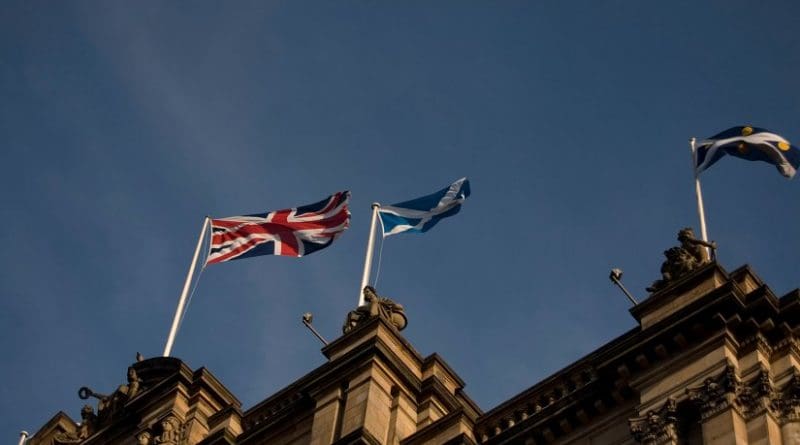Voters To Reveal Scale Of Scottish Threat To Johnson’s Rule – OpEd
By Arab News
By Andrew Hammond*
While Boris Johnson’s UK government has enjoyed buoyant poll ratings this year, it was last month hit by a series of scandals and will face an immediate electoral test as England, Scotland and Wales go to the polls on Thursday in the biggest ever set of ballots outside of a general election year.
Harm could be done to the ruling Conservatives in England’s local ballots and in the Welsh devolved elections, but it is Scotland that poses the biggest danger to Johnson’s premiership. The election in that country could lead to a second independence referendum in the space of a decade if the Scottish National Party (SNP) wins a majority.
The previous plebiscite in 2014 was lost by the SNP-supported “yes” camp to the tune of 55-45. However, support for the party has surged since and some polls indicate that more than 50 percent of voters now favor independence, with one game-changer here being Brexit, which 68 percent of the Scottish electorate voted against in 2016.
There is no question that the SNP will win the most seats in the Holyrood legislature on Thursday. But there is much more uncertainty over whether the party will win the absolute majority it wants to maximize pressure for a second referendum. If the SNP does secure a majority, it will heap potentially insurmountable pressure on Johnson. He knows that, if such a plebiscite were to be lost, his premiership would be over immediately, just as David Cameron’s was following the Brexit ballot.
With the stakes in play so high, Finance Minister Rishi Sunak waded into the debate on Monday by saying that another referendum on Scottish independence would put the UK’s economic recovery from the pandemic at risk. Sunak stressed the need to finish dealing with the coronavirus crisis, especially rebuilding the economy, before any such vote.
Logical as this argument is, however, the lesson of Brexit is that emotion can be the chief driver of voter sentiment. Whether the SNP can win a majority, therefore, lies on a knife-edge ahead of Thursday’s vote.
Part of the reason for this is the series of scandals that has hit Johnson’s Conservatives — already unpopular in Scotland — in the last few weeks. These started to reach critical mass following the wave of revelations surrounding former PM Cameron’s public affairs engagement work for the now-collapsed Greensill Capital financial group. An independent investigation has been launched into this affair, while various parliamentary committees have also announced their own probes.
The payment for the refurbishment of Johnson’s Downing Street flat has also hit the headlines. Meanwhile, the Cabinet Office has launched an internal investigation into the leak of his text message exchange with the billionaire businessman James Dyson after concerns were raised about the prime minister’s promise to change tax rules.
Perhaps the most damaging revelations, however, surround Johnson’s handling of the coronavirus crisis. A growing number of voices, including from within the Conservative Party, are calling for a public inquiry as soon as possible to look into why the nation has suffered one of the highest per capita death rates in the world and an economy hit harder than almost any G20 country.
This comes as new accounts emerge of a battle of wills within Downing Street, with a reportedly skeptical Johnson at odds with some key advisers over whether to implement a second lockdown last November. The prime minister reportedly said he would rather see the “bodies piling up” than introduce a new wave of sweeping restrictions.
The reason why a public inquiry has political danger for Johnson is that there is a relatively broad consensus that the government made significant mistakes and the prime minister’s political credibility has been tested repeatedly, with increased doubts about whether he is up to the job. While the decisions he has made during the crisis have been very tough, with no easy answers, his approach has too often been chaotic and incoherent.
The electoral impact of these scandals remains unclear ahead of Thursday’s elections. Several recent UK-wide polls, including one by Ipsos MORI, point to lower numbers for the Conservatives after a number of weeks of negative headlines. The Ipsos MORI survey put the Conservatives on 40 percent (-5) and Labour on 37 (-1). A separate poll by Redfield & Wilton found that half of voters view the government as mired in a “culture of sleaze.”
So, Scotland most likely aside, it is far from sure that Johnson will be humiliated on Thursday for at least two reasons. Firstly, the UK economy has returned to growth, with some predicting the country is on course for its biggest economic boom since the 1940s in the coming months. This has been enabled by the UK’s rapid vaccination rollout, which is the second reason why the prime minister may not receive a black eye from voters.
While this means Johnson’s hold on power appears stronger now than during much of 2020, it may be deceptive. His term could yet end prematurely — before the next scheduled UK general election in 2024 — especially if the SNP wins a majority in Scotland.
- Andrew Hammond is an Associate at LSE IDEAS at the London School of Economics.

